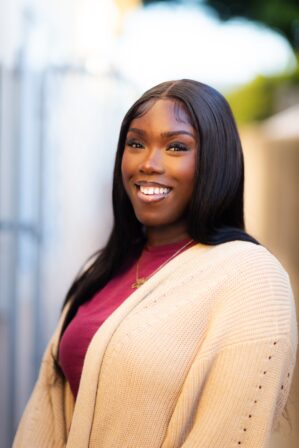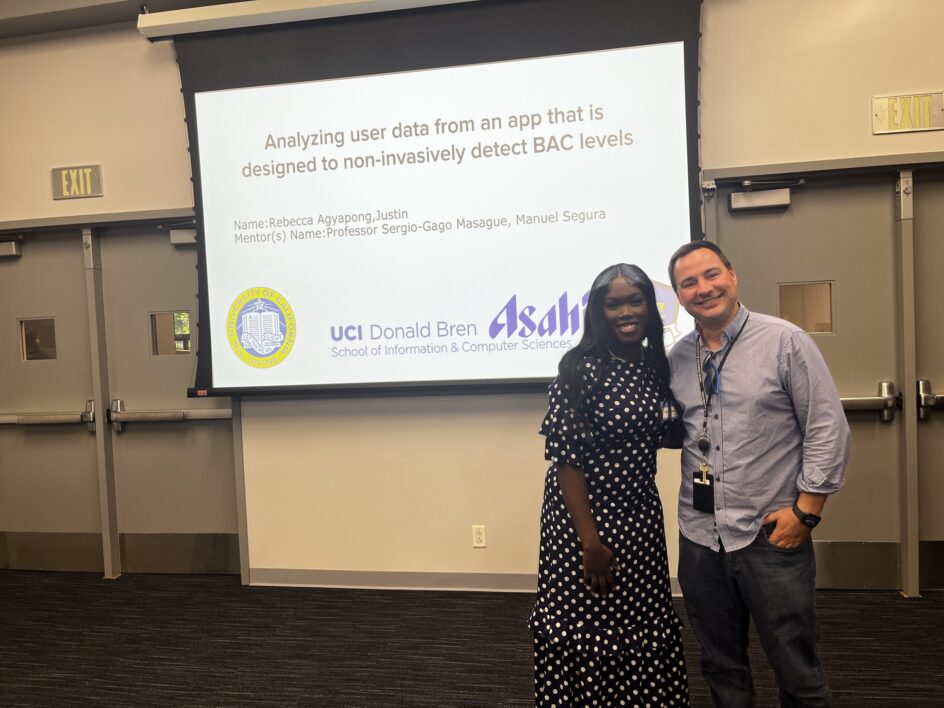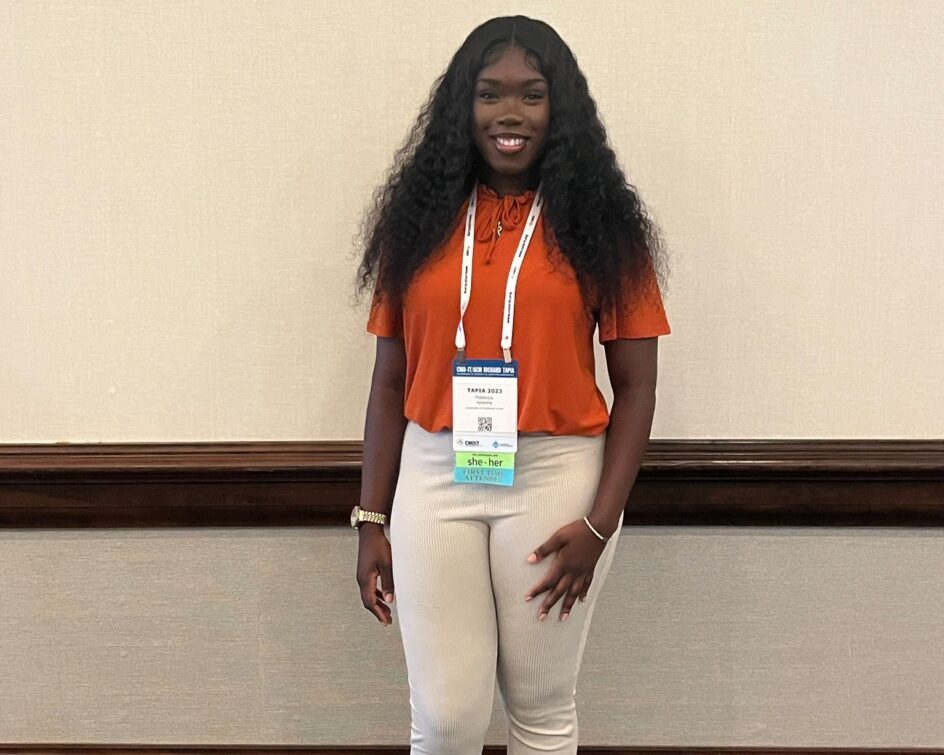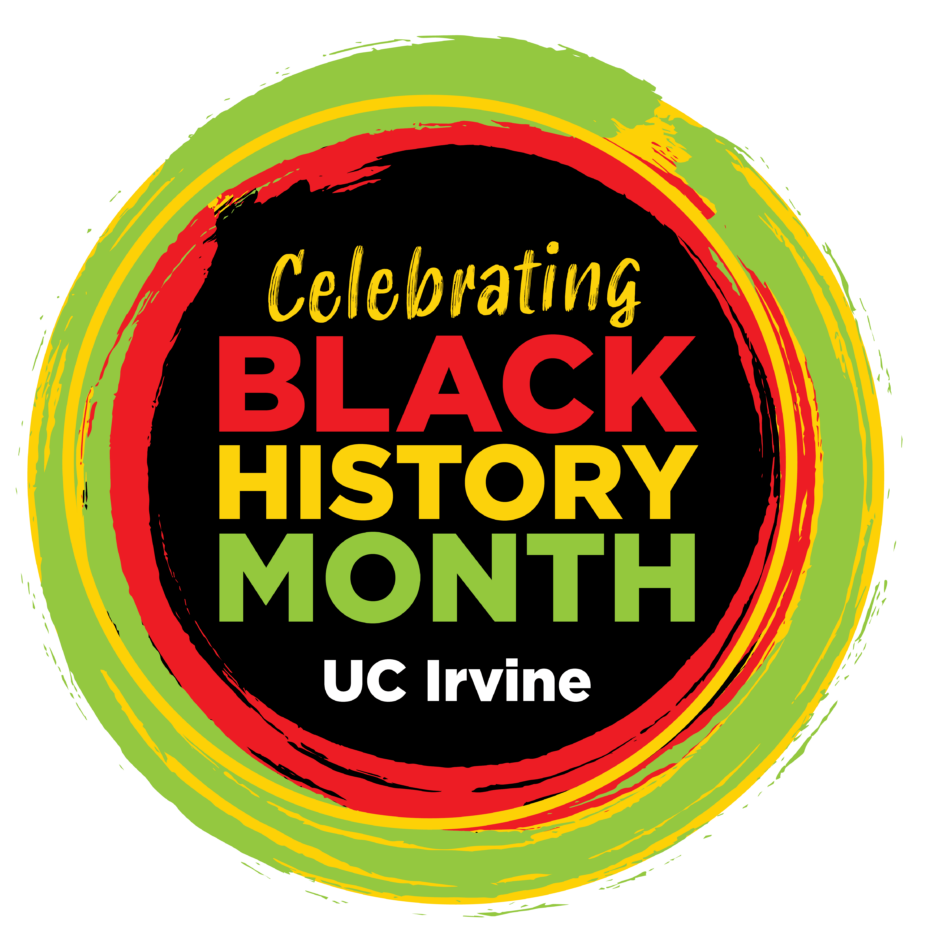Rebecca Agyapong Embraces Community in Exploring Opportunities in Tech
Student Spotlight: Third-year undergraduate Rebecca Agyapong shares her journey exploring software engineering — building a supportive community and amplifying Black voices along the way.

“You should do software engineering.” Those five words encouraged Rebecca Agyapong, a high school student at the time, to explore a career path she had never before considered. With Black women making up only 3% of computing-related roles, it’s not surprising the field hadn’t previously crossed her mind.
Now, Agyapong is a third-year student in UC Irvine’s Donald Bren School of Information and Computer Sciences (ICS). She has conducted research into Internet of Things (IoT) technology through the IoT-SITY program, a summer research opportunity supported by the National Science Foundation. She has networked at the Tapia Conference, a gathering focused on diversity in computing. And as an executive member of UCI’s National Society of Black Engineers (NSBE), she has found a community of support and has helped increase campus engagement. Here, she shares her journey exploring the field of software engineering and opportunities in tech, offering words of advice to others hoping to follow in her footsteps.
What first sparked your interest in software engineering?
This isn’t something I ever thought I’d do. I didn’t do anything related in high school, and math was my worst subject. But one day, this guy at my church said, “You should do software engineering!” I asked why, and he said he was a software engineer, and there’s not many Black women STEM, and it would be a great place for me.
Then when I got to college, I was undeclared and I didn’t know where exactly I fit. Everyone in my family is in the healthcare field, and both my sisters are nurses, but I knew that wasn’t for me. So I decided to try software engineering. It took me a bit of time to decide, but I actually declared my major this fall. So just that one conversation with a software engineer is basically what inspired me to get to this point!
And what led you to UCI?
I got into the majority of schools that I applied to, but I wanted to be close to home — just not too close! I live in Hawthorne, which is about an hour from here, and I felt like Irvine was in a really safe area. The campus is beautiful, very accommodating for low-income students, and there are a lot of opportunities here. It seemed like a good fit for me.
Speaking of opportunities, what was it like participating in the IoT-SITY program?
My software sophomore year, I felt behind, because it took me so long to get into my prerequisites for software engineering. I didn’t know before coming to college that I could have been undeclared in the School of ICS, which would have been simpler. But I was completely undeclared, so it was difficult getting classes, and I wanted to find a way to get more involved.
I saw a NSBE post on Instagram about IoT-SITY, but I didn’t know if I should join because I hadn’t even declared my major yet! So I talked to the NSBE coordinator, and we set up a zoom meeting to chat. He helped me figure out what to write, and I got accepted!
So that summer, I came back on campus for the program, and I met so many different people. The program really made me jump outside of my comfort zone! I got to work with Professor Sergio Gago-Masague on a smart watch project. It was a big learning curve — I didn’t even know what GitHub was — but through that experience, I learned so much. I got to work with Asahi Breweries, a Japanese Brewery company that wants to develop an application that can detect Blood Alcohol Content (BAC) through movement. We got to work with Apple watches and a Samsung watch, and I learned how determine what kind of data would be helpful and how to collect that data, and I learned about cloud computing. It was a very eye-opening experience, and I made a lot of connections.

You also attended the Tapia conference. How was that experience?
Vinh Luong, the coordinator of the OAI program, sends out lots of different opportunities, and he came to us during lab time one day and asked, “Rebecca, did you see the email that I sent you?” I had, but I was kind of scared. The conference was in Texas, and I had never traveled without my parents, but I told him I would look into it. So I applied for the scholarship to attend and then found out that I received it! The school prepared me, and there was actually a group of six or seven of us.
It was such a cool opportunity! I got to meet people and network and work on my interview skills. It was pretty intense, trying to sell yourself, but it was a great way to dip my toe into the waters of tech and also expose my mind to the possibilities of what it is I could do in the tech industry.

And what have you gained from being an active member of NSBE?
NSBE has been such a great experience for me. As I said before, I didn’t even think about studying software engineering, because I had never seen a Black woman do software engineering. Coming to NSBE and seeing that there’s groups of Black people here on campus that are interested in engineering is pushing me, showing me that I can do this.
I joined the board’s outreach committee as co-president last year, and we have dynamically increased our engagement by 300%. I planned a talk with engineers from industry, and I was able to get Joel Osei of Snap — the one who first told me to go into engineering — to come! We also had engineers from Boeing and from the startup Atomic DC. They talked to students about how they got to be engineers and spilled so many gems! NSBE is just a place of growth and Black excellence, and it’s a safe space where you can make connections.
For example, last quarter I took the hardest class of my life, but I was able to take that class with two members from NSBE, and we worked together. Also, one day when I was walking out of Donald Bren Hall, I saw one of the girls that was my roommate during the Tapia conference. I told her I was struggling, and she asked if I had heard of the OAI tutoring program. I said no, so she set up a meeting the next day, and I had a study plan to figure out what I needed to do to pass. And I passed!
Can you also talk about your interest in the intersection of technology and social justice?
When you think about technology, you don’t usually think about race. You think about technology as a separate factor, but the reality is that technology is not silent. It definitely has a voice, and that voice is cultivated through the different mediums and algorithms that we’ve created. And technology has definitely played a role in both social justice and racism.
That’s something I learned, especially this year in one of my classes, Informatics 161, which is on the social analysis of computing. We talked about the neutrality of technology and how it’s nonexistent. If used properly, technology can be used amazingly; if used negatively, it can be harmful. It just depends on how we decide to use it.
What are your future plans?
I’m planning on getting my master’s in business administration. Coding is not my ministry! After last quarter, I decided to switch from software engineering to informatics and human computer interaction. I’ve learned so much in informatics, which is more similar to my IoT internship, so now I’m taking a networking class, and I actually really love it. Last quarter I took a class on sustainable technology, and this quarter, in my ubiquitous computing class, we’re talking about electronic waste. The professor, Darren Denenberg, brought up how Ghana is where a lot of electric electronic waste is sent, and I’m Ghanan, so it’s something that’s heavy on my heart. I’m definitely interested in learning more about ways to mitigate this issue. So this could become my “why” as I figure out what I want to do in technology. But right now my plan is to get my master’s in business and then get into project management.
For Black History month, are there any resources or role models you want to highlight?
Something that other Black students should consider on campus is BMA, the Black Management Association. I never thought that engineers would get a master’s in business. I assumed they all became engineers. Then I went to the annual BMA Innovation Summit — the next one is April 5th to 6th — which is the perfect place to learn about different career options. That’s where I met engineers who had a master’s in business, and it opened my mind to what technology could do. You don’t just have to be a coder if you want to be in technology; there’s so many different things you can do.
The Black Resource Center is also a great place, a safe haven for Black students. If you’re hungry, there’s food. If you need to rest, you can sleep on the couch. If you want to do work, you can go there. You can meet people and make relationships. On Wednesdays at 4pm, they have the Sista Circle, where we do different things for mindfulness and to help release stress throughout the quarter.

And a person who many people may not know about is Debra Washington Brown. She didn’t go to UCI, but she’s a notable person as the first Black female computer scientist to earn her doctor’s degree. That was at Harvard in 1981, so not that long ago. Technology in general is fairly new, and this is a space that has not been pushed for Black women, but I’m here. I’m doing it. It’s not easy, but if I can make this far, you can too. There’s nothing you can’t do if you are determined. And Debra Washington Brown did it, and I find that so admirable and inspirational.
Any advice for students hoping to follow in your footsteps?
Don’t give up! Dr. Adisa Ajamu at the Black Resource Center was talking about why Black people tend to drop out of college, and a lot of it was because of the lack of community. He was talking about how Black people tend to distance themselves and not look for help, or they try to study on their own, but that’s why they’re feeling like they can’t do it. You need to build that community. It’s hard, but spaces like NSBE and the Black Resource Center let you know that you’re not the only one struggling. Don’t be afraid to look for help!
— Shani Murray